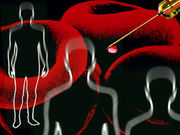Overall response rate 19%; additional 19% have antileukemic activity without meeting IWG criteria
FRIDAY, Aug. 12, 2016 (HealthDay News) — In patients with high-risk relapsed/refractory acute myelogenous leukemia (AML) or untreated AML unfit for intensive chemotherapy, the highly selective, oral small-molecule B-cell leukemia/lymphoma-2 (BCL2) inhibitor venetoclax is active, according to a study published online Aug. 12 in Cancer Discovery.
Marina Konopleva, M.D., Ph.D., from the University of Texas MD Anderson Cancer Center in Houston, and colleagues conducted a phase II single-arm study to examine use of 800 mg daily venetoclax in patients with high-risk relapsed/refractory AML or untreated AML unfit for intensive chemotherapy.
The researchers found that the overall response rate was 19 percent, and an additional 19 percent demonstrated antileukemic activity but did not meet International Working Group criteria (partial bone marrow response and incomplete hematologic recovery). Thirty-eight percent of patients had isocitrate dehydrogenase 1/2 mutations; one-third of these patients achieved complete response or complete response with incomplete blood count recovery. At screening, 19 percent of patients had BCL2-sensitive protein index, which was associated with time on study. BH3 profiling was consistent with on-target BCL2 inhibition, and was able to identify potential mechanisms of resistance. Nausea, diarrhea, vomiting, febrile neutropenia, and hypokalemia were common adverse events.
“Venetoclax demonstrated activity and acceptable tolerability in patients with AML and adverse features,” the authors write.
Several authors disclosed financial ties to pharmaceutical companies, including AbbVie and Genentech, which funded the study and are collaborating to develop Venetoclax.
Copyright © 2016 HealthDay. All rights reserved.








